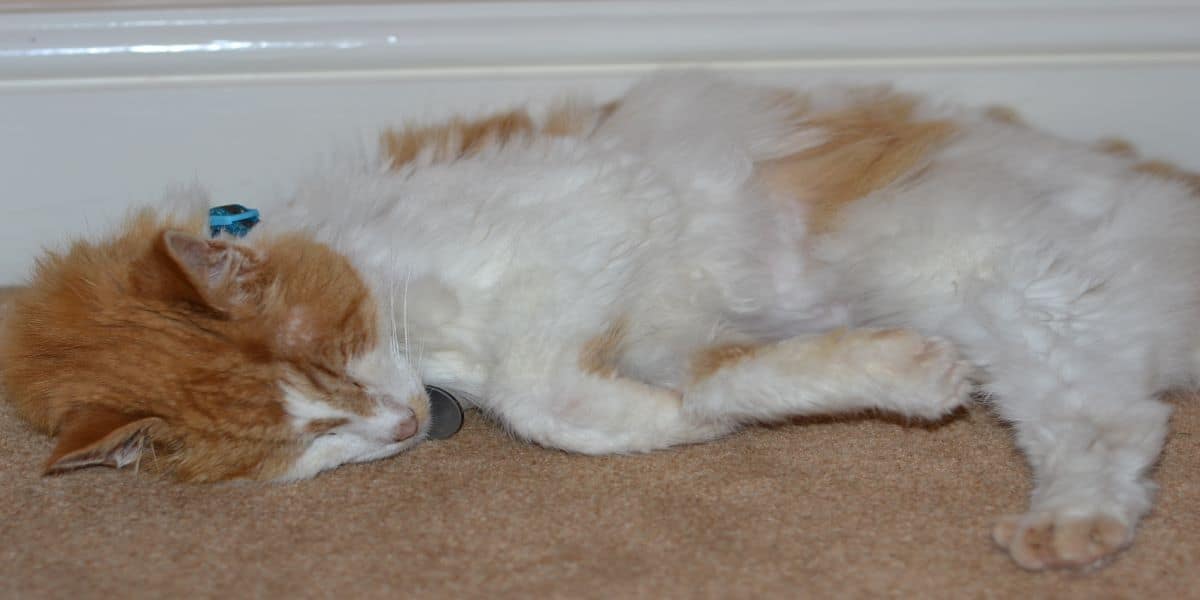Ageing pets can develop health issues, including dementia or cognitive dysfunction syndrome. Dementia is becoming increasingly common as the lifespan of our pets is longer. This condition causes changes to our pet’s behaviour, memory, and personality; as an owner, it is distressing to see our pet disorientated and confused. The confusion will distress our pet, and you may find your companion howling at night.
If you have a senior pet, it is important to be aware of the signs of dementia and visit your veterinarian if you have any concerns. Your veterinarian may prescribe medication or suggest a complementary feed, which can be purchased from an approved online pet shop. As an owner, you must know that dementia decline develops over time, but the condition can be managed successfully in the early stages.
What causes dementia (cognitive dysfunction syndrome)?

Our pets live longer thanks to advancements in veterinary knowledge and medication development, but as a cat or dog ages, gradual impairment with memory develops. Dementia is a degenerative brain disease that deteriorates over time, but not all animals develop the disease. For those with brain degeneration, symptoms will be mild, and changes will be subtle. Other pets may be in the later stages of dementia, but as an owner unfamiliar with dementia, you may be unaware of the issue.
Dementia can be managed but there isn’t a cure. Eventually, the condition becomes severe, and euthanisation is considered if your pet does not have a quality of life.
What are the symptoms of dementia in cats and dogs?
In cats, the signs to look out for are:
- Subtle changes at first
- Toileting outside of the litter tray
- Forgetfulness (forgetting to eat or forgetting they have eaten, where the food station is, litter tray or cat flap)
- Confusion and disorientation
- Loud vocalisation (loud meowing generally at night)
- Getting stuck in places and unable to free themselves
- Periods of depression and may stop eating or taking any medication.
- Change to sleep patterns (they may be awake at night time and asleep during the day)
- Reduced interest in playing
- Getting lost in familiar places
- Inability to learn new things or respond to words
- Staring at walls
- Less active
In dogs, the signs to look out for are:
- General behavioural changes
- Pacing and circling
- Being withdrawn, anxiety and depression
- Aggression
- Inability to free themselves from corners or to walk around an object
- Reduced interest in playing (try to introduce puzzle games to keep the brain active)
- Getting lost in familiar places
- Inability to learn new tricks or respond to any commands
- Staring into space
- Less active
- Eating less or more
- Memory loss
Will my vet morally suggest euthanasia if my pet has dementia?

Once dementia is diagnosed, your vet can advise you on how to manage the condition and perhaps suggest medication to slow the progression of brain degeneration.
Aktivait is available for cats and dogs and can be purchased at VioVet. It is a brand I used for my cat Albert. However, VioVet now has its own brand, which is considerably cheaper.
RenewMe is available at VioVet as a pack of 60.
When you start noticing behavioural changes in your pet, I recommend starting a diary and noting essential points – for example, the start and what your pet does. I do this. This information will help your vet work out what might be wrong. Please visit your veterinary surgeon – he will perform a general examination (heart, breathing, mouth, ears, eyes, mouth and weight) to dismiss arthritis, blindness, deafness and other issues. Then further tests may be recommended (blood, urine or faeces samples) to rule out other medical issues. Tests may include scans, ultrasounds and x-rays to exclude tumours or objects digested. Yes, I know you will have alarm bells ringing with the cost if you do not have insurance – speak to your vet. Honestly, only general tests were performed on my 16-year-old cat, Albert.
My vet suggested I give Albert a brain-functioning complementary powder called Aktivait, which I have reviewed. This did help him remember to eat, but it did not stop the nightly meowing. If your pet indeed suffers, will your vet be morally obligated to suggest euthanasia is the best option? When your pet reaches the end stages of dementia, it will be time to ask yourself a question. Am I keeping my pet alive for me?
How can I make home life easier for my pet?
Whether you live alone or as a family, it is a discussion for all. Your pet will be frightened of most things he was not scared of before. For example, he may be unable to tolerate boisterous children and other pets. You may need to separate your pets when you are away from home because, with the changes in the brain, your dog may become occasionally aggressive towards them and even towards, as mentioned, boisterous children. Please help your pet in the home. We all get old and less tolerant.
Keep everything in the same place – your pet’s bed, food and water, litter tray, and furniture. Any changes will confuse them. Make sure your home is not an obstacle course. Your pet’s brain may not compute how to walk around an object. A pet with dementia can find themselves trapped in corners, stuck behind furniture – they will not be able to calculate how to walk backwards to free themselves from a situation.
Look out for items your pet can get caught up in … cables, handbags, string, bra straps, their lead. I made a mistake and left a bra hanging from the bathroom door handle. Albert had put his head through the strap and turned around in circles until it became a noose. He was okay and quickly forgot the incident. I, on the other hand, shook and cried.
Please never punish your pet for toileting accidents, snapping or lashing out with a claw – the disease is not their fault. You can try to retrain your pet gently – I would walk my boy Albert from the garden to the back door. Eventually, I let him walk ahead of me, but Albert was never left unsupervised. An animal with dementia would be unable to survive outdoors alone.
Use music for relaxation purposes or in the room they can associate something with.
kitchen = food or lounge = family and cuddles.
Consider brain puzzles to keep a dog’s mind active. For cats, maybe place bird feeders near windows for brain stimulation. Consider motion sensor night lights – they reduced Albert’s vocalisation by 80%. It may not work for every animal, but it is worth trying. I bought strip lights a few months ago but like everything in 2022, the price has increased.
Updated: January 2023
I purchased a Lepro camping lantern for my 16-year-old cat Tabitha. And it can be used in replacement for electricity! When charged, you get 12 hours of light. It is charged with a USB cable and takes about 1 hour. It comes with two torches; if you use it for camping, you have two red light distress lights.
I bought mine on Amazon but recommend finding someone with Prime to save on postage costs.
Related articles:
- My pet has been diagnosed with dementia – what is next?
- Does your vet offer a FREE video vet service?
- Budget-friendly pet care – swap expensive products for cheaper equivalents
- Protecting your pet with dementia after your death
- Aktivait – complementary feed that helps pet dementia (recommended by my vet)
Is it safe for my pet to go outdoors alone?

Ask yourself this – if a parent has dementia, would you allow them to go outside alone? Or would you worry they might wander off and have an accident or worse?
The same applies to your pet. Now is the time to walk your dog on lead. Go out for short walks. Allow your dog to sniff vegetation for sensory enrichment and brain stimulation. Consider a cat run or cat-proof the entire garden for your feline. And in general, look around your garden for any dangers that may harm or prove fatal to a dog or cat with dementia.
Possible dangers for your dog or cat:
- A pond they can fall into
- The mesh over the pond
- Escape routes
- Garden tools and saws
- High levels
- Predators or visiting cats
- A ditch
- Anything they can get caught in and unable to get out
- Buckets or tubs filled with water they can fall into
- Rabbit burrows or badger set
What is the life expectancy for a cat or dog with dementia?
You cannot tell. You will know when the time comes to say goodbye and however hard that will be. Remember, it is harder for your pet if their quality of life is no longer there. Deciding to end our pet’s life when they cannot decide for themselves is the hardest decision when owning an animal. I have been there three times between 2017 to 2019, and it is the worst feeling and the loss is unbearable.
But remember, you are making the kindest choice, as no one wants their pet to suffer. The loss is huge, I know. But while they are with you, read as much as possible, keep in touch with your vet, update the diary, assess your home, be patient and support your cat or dog, keep your pet safe outside, and make the most of every reward day. And give them all your love, as they will need you more than ever.
Albert passed away from a blood clot and not dementia. His weight was low – dementia caused bouts of depression, and he would not eat food or take his thyroid tablet or Aktivait powder, so his weight was balanced at 2.43kg. He had thyroid issues which contributed to his weight loss too. Unfortunately, weighing so little meant he could not be operated on to remove the clot.
In memory of Albert:
He is so missed.
Disclaimer
This article does not give medical, or veterinary advice. Please consult your licensed veterinary surgeon for professional medical advice, who will advise on health tests for your pet.
Poppys Pets is a participant in Awin and Amazon Associate affiliate programs which compensates me for referring traffic. It is of no extra cost to you and if thinking of buying a product, please consider using my link. It\'ll earn Poppy\'s Pets a few pennies to continue to this website. Only a selection of articles and videos on this website and YouTube channel contains affiliate links. Further information: Disclaimer and Privacy Policy
Poppy’s Pets has a column in an East Yorkshire Newspaper


